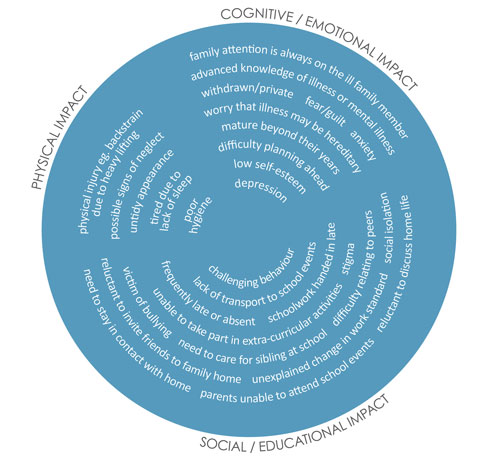Working in a school setting means you’re in a special position to encourage teenagers to access support
What the research tells us
It is estimated that approximately one in four children live in a family where a parent has a mental illness.
Research into the wellbeing of these children shows that access to appropriate support can improve their wellbeing and reduce the likelihood of them developing their own mental health issues.1
Re-thinking help-seeking
Literature about help-seeking behaviour in adolescents often refers to helping them find help for mental health problems. We prefer to take a broader view of ‘help’ as any form of support or assistance that a teenager might need related to their parents’ mental illness.
This might include:
- Emotional support to develop coping skills and build personal resilience.
- Access to information about mental illness and the symptoms experienced by their parent.
- Practical help with household tasks and other caring activities.
- Extra support at school.
- Support for challenging behaviour or family relationships.
- Help for teenagers’ own mental health concerns.
- Assistance to take time out or access respite.
In this context, help might include informal assistance from family and friends or assistance and support from providers in mental health, education or welfare services.
Stages of help-seeking
The stages of help-seeking are commonly defined as:
- Identifying the need for help.
- Deciding to seek help.
- Finding and accessing the appropriate help.

Why it’s challenging for teens
For teenagers in families where a parent has a mental illness, identifying the need for help can be especially challenging as they may perceive their own life as ‘normal’ and may not recognise that they have a need to seek help. The decision can also be affected by a range of concerns for both the teenager and the parent including concerns about confidentiality and stigma, and fears of the involvement by mental health or child protection services.
Service providers need to be aware that an initial request for help can be a particularly vulnerable moment for the teenager. The response they receive will often determine whether they continue to seek help and whether the help is accepted or not.
Accessing help is also often based on the willingness of the parent to allow and support their child’s efforts, as well as practicalities such as eligibility for services, location, transport and cost.
Is it part of your job to support the whole family?

The answer is – YES!
Numerous policy documents highlight that promoting mental health and the safety of children is everyone’s responsibility. Children of parents with a mental illness may have limited contact with adults who can facilitate and encourage them to connect with support services, meaning they may not identify or seek help until they reach crisis point.
Research suggests that adolescents are most likely to seek help from someone they already have a positive and trusting relationship with.2 Working in a school setting where you establish close relationships with students gives you a unique opportunity to assist young people to seek help. There may also be scope within your role or as a wider school community to provide parents with information, support the development of parenting skills and help parents to access support services that can help the whole family.
How can I tell if a student has a parent with a mental illness?
The diagram below lists signs that could indicate a student has a parent who has a mental illness. Keep in
mind that:
- Some children of parents with a mental illness may not show any of these signs.
- Other children may have these indicators, but they could be due to reasons other than the mental illness of a parent.
- These signs can also be indicators that a child has caring responsibilities for someone in their family. A child’s caring role could be due to mental illness, however could also be due to disability, chronic illness, drug and alcohol misuse or ageing.

Diagram adapted by the COPMI national initiative with permission from Carers Australia and Carers South Australia.
Taking a whole-of-school approach to promoting help-seeking
You may come across situations where you think that a parent has a mental illness but the family is unwilling to engage with you about it. In other cases a parent may want their child to access counselling or other supports but the young person may be reluctant.
Withdrawal, avoidance and social isolation are commonly associated with mental illness and can result in a reluctance by people with mental illness to seek help (known as ‘help negation’). This can mean that those who most need help often don’t seek it out. Help negation in a parent with mental illness can extend to discouraging help-seeking by their child as well as themselves.
A young person may also have concerns about seeking help and have beliefs that they should handle their problems alone. Teenagers who have a parent with a mental illness have told us that communities, schools and their own families lack knowledge and awareness about mental illness and how it affects young people. This creates prejudice and stigma which they overwhelmingly described as a barrier to seeking help and support.
You can break down stigma and encourage help-seeking by:
- checking out the information for schools, teachers and educators on this website and implementing some of the suggested strategies
- taking a whole-of-school approach to learning about mental illness by including specific topics relating to mental illness in the curriculum, so that young people can access the information they need without being singled out. (The MindMatters website has a comprehensive suite of mental health resources for teachers, including classroom activities)
- emphasising mental health and how to access support as part of your student wellbeing or pastoral care program
- strengthening a school culture where staff and students can talk about mental illness openly and avoid language that promotes stigma.
- ensuring all staff attend professional development on mental health and children of parents with mental illness topics
- being aware that schools have a key role to play in mental illness education and in dispelling stigma so that all children can access the help they need.
What kind of help can I offer?
Learn about what stops teenagers from seeking help – and what you can do about it, including how to offer help to your students.
1. Maybery, D.J., Reupert, A.E., Patrick, K., Goodyear, M., Crase, L., 2009, Prevalence of parental mental illness in Australian families, Psychiatric Bulletin [P], vol 33, issue 1, Royal College of Psychiatrists, UK, pp. 22-26.
2. Wilson, C.J. & Deane, F.P., 2001, Adolescent Opinions About Reducing Help-Seeking Barriers and Increasing Appropriate Help Engagement, Journal of Educational and Psychological Consultation, vol 12, issue 4, pp. 345-364. http://dx.doi.org/10.1207/S1532768XJEPC1204_03

